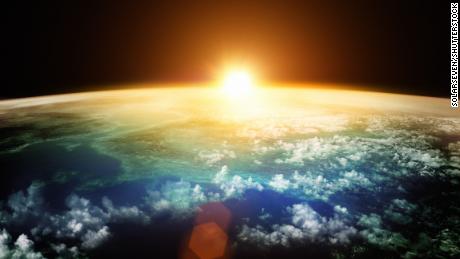(CNN)A new report a British advisory body has called for a 20%-50% cut in the number of sheep and cattle to help combat climate change -- adding to the growing international consensus that eating red meat is not only bad for your health, it is also bad for the environment.
Lamb, beef and dairy production accounts for the majority of greenhouse gases emitted by farms in Britain, with sheep and cattle directly responsible for around 58% of agricultural emissions in the UK in 2016, says the report by the government's Committee on Climate Change (CCC).
The advisory body suggests that a dramatic reduction in the consumption of cow and sheep products could release up to 7 million hectares of grassland, which could instead be planted to create forests and help store carbon.
It recommends that the UK's land under forestry should increase to 19% from 14%.
The committee also said a reduction in beef and lamb consumption would lead to a rise in the consumption of plant-based food, as well as chicken and pork.
The government's "Eatwell Guide" for a healthy and balanced diet outlines the proportion of a person's diet that each food group should provide. The report says that following these guidelines would lead to a dramatic reduction in the amount of red meat eaten by the population, with an 89% reduction for beef and a 63% reduction for lamb. This would also see a 20% decline in dairy products.
The target of reducing sheep and cattle numbers by 20%-50% also relies on people following the recommended diet, with the 20% goal achievable if people replace red meat with chicken and pork. The higher 50% goal would involve people switching to meat alternatives or substitutes.
The report, which has an overarching goal to create a "a new land use policy" that will help mitigate climate change, also includes recommendations to increase Britain's forested area as well as the restoration of the country's peatlands and the reduction of flood risks.
"This is a wake-up call for a complacent government that we must completely transform the way we use land, to avoid climate breakdown and make space for nature," Friends of the Earth campaigner Guy Shrubsole said in a statement.
"As the Committee on Climate Change says, we need to free up land from agriculture by eating much less meat and dairy, and stop landowners burning and degrading peat bogs -- our single biggest carbon store."
Animal farming is responsible for 14.5% of the world's greenhouse emissions, according to the UN's Food and Agriculture Organization, making it a significant contributor to climate change. Of those emissions, 65% comes from beef and dairy cattle.
A recent report by the UN's Intergovernmental Panel on Climate Change emphasized the need for people to consume about 30% less animal products. Eating less meat is one of a number of mitigation strategies suggested by the IPCC to overhaul agricultural and land-use practices, including the protection of forests.
A study last month predicted that as a result of population growth and the continued consumption of large amounts of red meat and processed food in the West, the environmental pressures from the food system could increase by up to 90% by 2050.

























